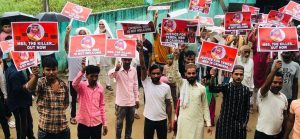Amidst the grandeur of the G20 Summit being hosted in India, a passionate demonstration unfolded on the streets of New Delhi as protesters voiced their strong opposition to the visit of Saudi Arabia’s Crown Prince, Mohammed bin Salman bin Abdulaziz Al Saud. The protest, which revolved around condemning Crown Prince MBS for his alleged involvement in the Yemen conflict, sent a resounding message of solidarity with the Yemeni people.
With placards displaying slogans such as “War Criminal MBS is not Welcome,” “MBS, Killer out now,” and “Arrest MBS For Yemen Crimes,” the protesters made it clear that they view the Saudi Crown Prince as culpable for the suffering of thousands of Yemeni civilians, including children and women.

The war in Yemen, which has been ongoing since 2015, has led to widespread devastation. Over 150,000 people have been killed as a direct result of military actions, and nearly 15,000 civilians have lost their lives in attacks targeting civilian areas. The conflict’s dire consequences have drawn international attention, with the United Nations estimating that by the end of 2021, the war had claimed the lives of 377,000 people.
Among the protesters was Fatima Abbas, who emphasized the urgency of addressing the Yemen crisis. “We cannot turn a blind eye to the suffering in Yemen any longer. Crown Prince MBS must be held accountable for his actions,” Abbas asserted.
Rahul Kumar, another demonstrator, called for international intervention. “It’s not just India; the world needs to take a stand against those responsible for the war in Yemen. Innocent lives are being lost, and we cannot let this continue,” Kumar stated.
As the G20 Summit seeks to address various global issues, including economic cooperation and climate change, the protesters in India hope that their voices will serve as a reminder of the ongoing humanitarian crisis in Yemen. While world leaders convene to discuss pressing matters, these demonstrators demand justice for the victims of a conflict that has left a lasting scar on Yemen and its people.

